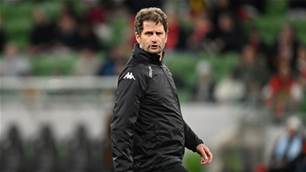Football Victoria believes the first stage of their Home of the Matildas could be complete before Australia and New Zealand potentially host the Women's World Cup in 2023.
Australia and New Zealand's campaign to host the 2023 tournament was given a boost last night when FIFA's evaluation process ranked the joint bid highest
It followed news on Tuesday that Brazil had abandoned their efforts to host the tournament, leaving bids from Japan and Colombia as the only remaining roadblocks.
While the Home of the Matildas isn't tied to the success of the WWC bid, the proposed project would more likely twin support if the "As One" bid succeeds.
In the lead into the 2019 election, FV received a $15m commitment from the Federal Government towards the project and a State Government-funded feasibility study was submitted for Victoria's October budget.
Despite this momentum, however, a recent report from The Sydney Morning Herald revealed the FFA was set to lobby for a facility in Sydney that would become a permanent home for the Socceroos and the Matildas.
The FFA were said to be petitioning the NSW government to use part of $810m saved from abandoning the ANZ Stadium redevelopment to use for a new home of football.
Speaking to FTBL, CEO Peter Filopoulos bristled at the possibility that Victoria could miss out on the future home base of Australia’s most popular team to its northern neighbours.
And he detailed how plans were afoot to have the first phase of construction of a Victorian home completed ahead of a potential 2023 World Cup in Australia and New Zealand.
“The home of the Matildas project is one we’ve been working on for two years,” Filopoulos said.
“We’ve got support from the Federal Government and currently we’ve got a feasibility study in with the State Government for budget commitment this October.
“We’re almost down to selecting the site with a view of starting construction in 2021 and having phase one finished by 2023. Phase one will be a $45m project and the second phase will start sometime after its completion and the end project will be a $90m, world-class national training centre.
“[FFA] chairman Chris Nikou, the board and James Johnson are fully supportive of this project. We’ve got a very supportive Victorian state government who are right behind this project and so is the federal government.
“It’s natural to think that a NSW government would look at this and try to spoil the party for Victoria. Hence why I thought it was important that we stake our claim to it and make sure NSW knows that this project is well in advance.
“For me, this project will be a landmark asset for Australian football and an example of what we need in every capital city in Australia. Our vision is that it will be a centre of excellence of women’s football: our talent development pathways, the Matildas themselves, the Young Matildas, and the Junior Matildas.
“We want to use it as a centre of excellence for women’s football in Asia as well. That is one of the things we’re working on in the background to get a lot more international usage out of the facility – especially given the emergence of women’s football.
"If we have such a landmark asset, a world-class facility here in Victoria, I see a lot of use for it for teams and other nations to come here for their camps.”
A potential home of the Matildas, however, is just one of several facilities projects set to be pursued in Victoria in coming months.
According to FV’s 2019 Annual Report, footballing projects throughout the state had secured $240m in funding in 2019, including $130m for female-friendly change-rooms, buildings and ground improvements and for business cases and facilities planning and another $94m for the projects aimed towards securing the organisation’s target of a further 420 full-size equivalent pitches by 2027.
Boosting these plans was the announcement of $2.7b stimulus plan to boost the Victorian economy in the wake of COVID-19 by the State Government in May, which earmarked $60m in funding for new sporting facilities.
Lakeside Stadium – home of NPL Victoria side South Melbourne and occasional base of Melbourne Victory’s W-League and Y-League teams – has already been announced as one of the beneficiaries of the project.
Funding of between $1m and $10m will be available for shovel-ready projects as part of the stimulus spending, which Filopoulos says can be added to the existing World Game Facilities Fund to help shrink the facilities gap which exists in the state.
“We have about $13m worth of applications in for the World Game Facilities Fund,” Filopoulos explained.
“Year one of that fund is only $4m, and we’re looking for ways to try and get all $13m funded through this process. Hopefully this infrastructure fund can help fund all those world game funding applications for this year.
“In the last two years at Football Victoria, we’ve really driven this agenda around the facilities gap. You can see what we’ve achieved in two years and I don’t think we’ve scratched the surface.
“I think we can nationalise this story as one national narrative. My findings, in approaching this, is that it hasn’t been because of a lack of interest from the government to support us: it’s because football has in the past failed to tell its story well.
“[FV] developed a data-driven narrative and a data-driven strategy that clearly demonstrated a facilities gap based on our growth. We grew 24% in 2018, another 29% in 2019 and we were able to demonstrate through data that between 10,000-15,000 boys and girls a year miss out on playing at clubland because clubs can’t accommodate them – there are not enough facilities.”
Related Articles

'Timing not right': Montemurro's verdict on Matildas vacancy

Matildas: 'Fourth at the Olympics is honestly the worst place you could come'
.jpg&h=172&w=306&c=1&s=1)













